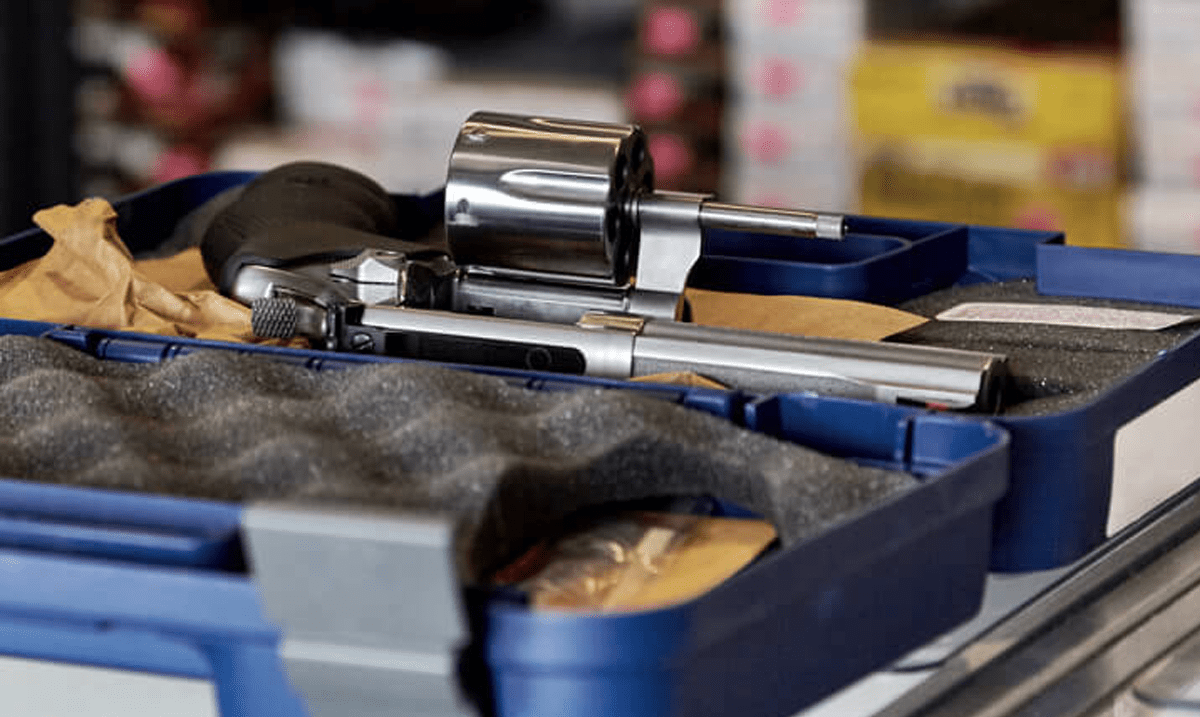 Back to News
Back to News
June 11, 2025
The Industry’s Resounding Supreme Court Victory
In Smith & Wesson Brands, Inc., et al. v. Estados Unidos Mexicanos, the U.S. Supreme Court unanimously rejected the Mexican government’s brazen lawsuit designed to regulate the firearm industry into oblivion based on an attenuated theory of liability for the lawless actions of narco-terrorist cartels within its own borders. The ruling is a resounding victory for the rule of law, as it vindicates the principles underlying the bipartisan Protection of Lawful Commerce in Arms Act (PLCAA), which Congress passed in 2005 for the very purpose of stopping frivolous lawsuits just like this one.
Mexico Seeks Gun Control Through Judicial Fiat
In 2021 Mexico sued Smith & Wesson, Inc., and other industry members in federal court in Boston, claiming that these entities are responsible for the harms the Mexican government has incurred because of Mexican drug cartels illegally smuggling firearms into their country and committing crimes within Mexico’s borders. Based on this audacious theory, Mexico sought $10 billion in damages and an injunction that would, among other things, ban Modern Sporting Rifles (MSRs) – which lawyers for Mexico wrongfully claim are “assault rifles,” limit magazine capacity and regulate the sale of firearms in the U.S. In other words, Mexico wanted to bankrupt the industry, infringe on Second Amendment rights and impose its own failed gun control policy agenda through judicial fiat on our own soil. Mexico wanted to use the U.S. judicial system to trample on our national sovereignty and usurp the constitutional authority of Congress, and the States, to make law.
Mexico’s lawsuit should have been an open-and-shut case. The District Court of Massachusetts agreed, holding that Mexico’s gambit was exactly the type of action the PLCAA was enacted to prevent and, therefore, should be immediately dismissed.
Unfortunately, the U.S. Court of Appeals for the First Circuit reversed the district court’s well-reasoned decision and concluded that Mexico’s lawsuit could go forward because it claimed its case falls within an exception to the PLCAA (i.e., the predicate exception). The predicate exception is exceedingly narrow, as it provides that the PLCAA’s grant of immunity from suit does not extend to claims that an industry member knowingly violated a specific firearm law and that the violation was the proximate (i.e., direct) cause of the plaintiff’s injuries. However, the First Circuit determined that Mexico had plausibly alleged that the industry defendants’ longstanding, legal business practices somehow aided and abetted downstream, illegal straw purchases of their products.
Smith & Wesson, Inc., and the other industry defendants filed a cert petition with the Supreme Court, and the Court granted review. The Supreme Court heard oral argument and ruled unanimously in favor of the industry defendants.
SCOTUS Rejects Mexico’s Bid
The Supreme Court rejected Mexico’s theory of liability in a 9-0 decision written by Justice Elena Kagan. It explained that the lawsuit is barred by the PLCAA because “Mexico’s complaint does not plausibly allege that the defendant gun manufacturers aided and abetted gun dealers’ unlawful sales of firearms to Mexican traffickers.”
To begin, the Court explained that federal aiding-and-abetting law is premised on the centuries-old standard that a person is not responsible for a crime he did not personally commit unless he deliberately “helps another to complete its commission.” In other words, an aider and abettor must “participate in” the crime “as something that he wishes to bring about” and “seek by his action to make it succeed.” More recently, the Court explained in a case brought against social media companies that aiding and abetting claims do not meet this standard if a plaintiff alleges that a company has mere knowledge that “some bad actors” are taking “advantage” of its products for criminal purposes.
After laying out those bedrock principles of law, the Court systematically rejected Mexico’s theories that the defendant manufacturers aided and abetted unlawful sales of firearms to Mexican traffickers.
First, Mexico alleged that the manufacturers chose to sell guns to “known rogue dealers.” But Mexico’s complaint did not pinpoint any specific transactions that the manufacturers assisted, nor did it identify the so-called “bad-apple dealers” that the manufacturers allegedly aided. Moreover, the Court explained that Mexico’s sweeping allegation that “manufacturers intentionally supply guns to bad-apple dealers” could not be taken “at face value” because “Mexico never confronts that the manufacturers do not directly supply any dealers, bad-apple or otherwise.” Rather, manufacturers sell firearms to distributors, “whom Mexico has never claimed lack independence.” Likewise, the Court noted that even if manufacturers “know everything that distributors know,” the complaint is still inadequate because Mexico not only failed to identify these dealers itself but also failed to show that anyone up the supply chain acquires that information.
Second, Mexico claimed that manufacturers “declined to suitably regulate the dealers’ practices” by implementing constraints on their distribution chains that might “reduce the possibility of unlawful conduct.” Mexico’s examples included “bans on bulk sales or sales from homes,” which are permitted under federal law. The Court rejected this theory, explaining that such “omissions” or “inactions” do not constitute aiding-and-abetting liability, “especially in an already highly regulated industry.”
Finally, Mexico argued that manufacturers are liable due to “design and marketing choices” intended to “stimulate” the cartels’ demand for their products, which included the production of “military style assault weapons,” including AR-15 rifles, AK-47 rifles and .50 caliber rifles. The Court likewise rejected these allegations as “nothing of consequence,” explaining that “those products are both widely legal and bought by many ordinary consumers” and the AR-15 “is the most popular rifle in the country.” As a result, manufacturers “cannot be charged with assisting in criminal acts just because Mexican cartel members like those guns too.” The Court also rebuffed Mexico’s contention that manufacturers have declined to make firearms with “non-defaceable serial numbers,” explaining that the “failure to improve gun design in that way (which federal law does not require)” does not amount to aiding and abetting liability.
PLCAA Vindicated
The Supreme Court concluded that because Mexico did not meet the demands of the predicate exception by plausibly alleging that the manufacturers aided and abetted firearms violations, the lawsuit is barred by the PLCAA. The Court noted that this result “accords with PLCAA’s core purpose,” as Congress enacted the statute “to halt a flurry of lawsuits attempting to make manufacturers pay for the downstream harms resulting from misuse of their products” and Mexico’s lawsuit “closely resembles the ones Congress had in mind.” Indeed, if Mexico’s lawsuit fell within the predicate exception, it would “swallow most of the rule.” As a result, the Court concluded that the PLCAA provides immunity to the manufacturers against Mexico’s claims.
Although it should not have taken a trip to the highest court in the land to throw out Mexico’s frivolous lawsuit, the Supreme Court’s decision is a monumental victory. The lawsuit was presented to Mexico by Jonathan Lowy. If that name is familiar it is because he was the architect of similar frivolous municipal lawsuits in the late 1990s and early 2000s that gave rise to the PLCAA. Lowy, a former top lawyer for the gun control group Brady, and Elizabeth Burke, also a former Brady lawyer, registered as foreign agents of Mexico under their new venture Global Action on Gun Violence. Brady, of course, was a backer of Mexico’s lawsuit against U.S. firearm manufacturers. In enacting the PLCAA, Congress took action to stop activist efforts to bankrupt a lawful industry that is vital to the exercise of a fundamental constitutional right. The Supreme Court’s unanimous ruling sends a clear message that the newest iteration of lawfare against the industry will not be tolerated.
Indeed, Justice Ketanji Brown Jackson wrote a concurrence agreeing with the Court’s decision and noting that Mexico’s conclusory allegations exposed its lawsuit as “precisely what Congress passed PLCAA to prevent.” She further contended that the PLCAA embodies Congress’s intention to stymy activists “who, as Congress put it, sought ‘to accomplish through litigation that which they have been unable to achieve by legislation.” Justice Jackson also had harsh words for Mexico’s strategy of hijacking the courts to achieve its policy goals: “Devoid of nonconclusory allegations about particular statutory violations, Mexico’s lawsuit seeks to turn the courts into common-law regulators.”
The Implications of the Court’s decision
As noted, the Smith & Wesson decision is a victory across the board for the industry, as it reaffirms the strength of the immunity provided by the PLCAA against lawsuits seeking to hold industry members liable for criminal or unlawful misuse of their products by a third party. Going forward, courts and would-be plaintiffs should heed the Supreme Court’s admonition that “capacious” interpretations of the PLCAA’s exceptions – especially those that “swallow most of the rule” – will not fly. Put another way, the clear lesson of Smith & Wesson is that the PLCAA cannot be easily evaded by putting lipstick on a pig – i.e., trying to reinvent the same, tired theories of general liability for criminal misuse of firearms that prompted the passage of the bipartisan statute.
What is more, the Supreme Court’s ruling likewise handed the industry another subtle win in relation to challenges to hardware bans. The Smith & Wesson decision shows that all nine justices agree with the statement that AR-15s are “widely legal and bought by many ordinary citizens” and are “the most popular rifle in the country.”
Although no Second Amendment claims were teed up in Smith & Wesson, that passage of the opinion makes it clear beyond cavil that AR-15s are in common use for lawful purposes. As such, an outright ban violates the Constitution under the Supreme Court’s District of Columbia v. Heller and NYSRPA v. Bruen precedents. While the Supreme Court recently passed on an opportunity to take up a hardware ban case, NSSF hopes that Justice Brett Kavanaugh’s statement on denial and prediction that the Court will take up the issue in the next Term or two is correct. Although the Court’s current reluctance to review an MSR ban is disappointing, its characterization of AR-15s in Smith & Wesson as lawfully and widely owned by ordinary citizens is cause for celebration and hope.
Shelby Baird Smith is the Chief Litigation Counsel for NSSF.
You may also be interested in:
Surprise, Surprise: Millions More Lawful Gun Owners, Antigun State Govs. Plug Crime ‘Going Down’
Categories: BP Item, Featured, Government Relations, Top Stories









